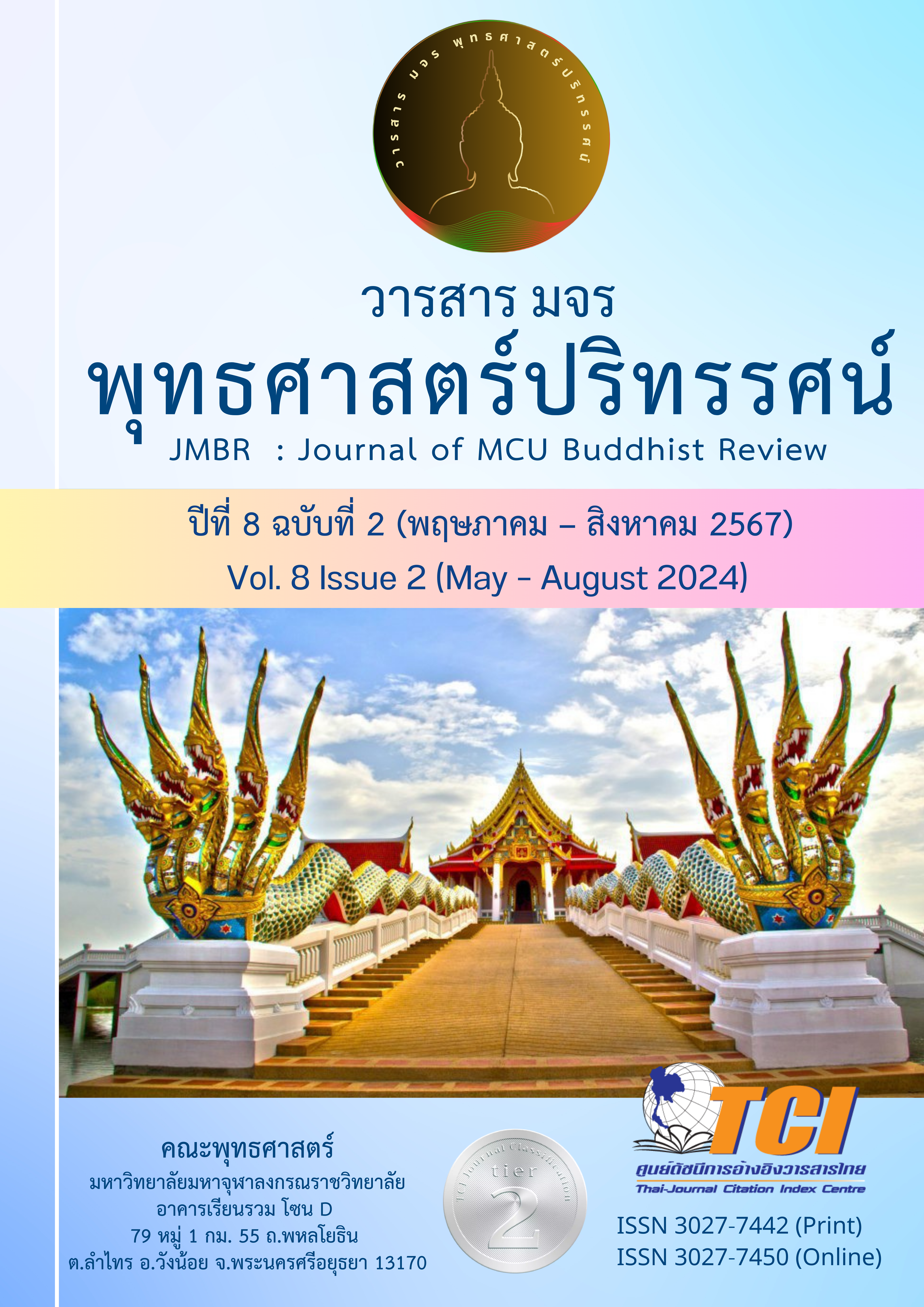การศึกษาวิเคราะห์การพัฒนาจิตตามแนวมรณัสสติสูตร
Main Article Content
บทคัดย่อ
บทความวิจัยนี้มีวัตถุประสงค์ 1) เพื่อศึกษาการพัฒนาจิตในพระไตรปิฎก 2) เพื่อศึกษาโครงสร้างเนื้อหาของมรณัสสติสูตร 3) เพื่อวิเคราะห์การพัฒนาจิตตามแนวมรณัสสติสูตร การวิจัยนี้เป็นการวิจัยเชิงเอกสาร ผู้วิจัยมุ่งศึกษาวิเคราะห์ข้อมูลจากคัมภีร์พระไตรปิฎก อรรถกถา และวรรณกรรมทางพระพุทธศาสนา
ผลการศึกษาพบว่า 1) การฝึกฝนพัฒนาจิตเป็นกระบวนการสำคัญที่จะนำไปสู่การสิ้นกิเลส อาสวะ การพัฒนาจิตคือการเพิ่มคุณภาพจิต โดยการนำหลักสมถะ วิปัสสนา ไตรสิกขา มหาสติปัฏฐาน มาใช้ในการดำเนินการพัฒนานั้น จิตจะตั้งมั่นมีสติ สมาธิคลายความยึดมั่นถือมั่น 2) มรณัสสติสูตรกล่าวถึงหลักการ 3 ประการ (1) การมีสติระลึกถึงความไม่แน่นอนของชีวิต (2) ความสลดใจในการดำเนินชีวิตที่ประมาท (3) การระลึกรู้ถึงความตายอยู่เสมอ และปฏิบัติตามหลักธรรมเพื่อให้บรรลุเป้าหมายคือความดับทุกข์ 4 ประการ คือ (1) อภิณหปัจจเวกขณะสูตร (2) กฎอิทัปปัจจยตา (3) โยนิโสนมสิการ (4) อสุภกรรมฐาน 3) การอบรมกายและการอบรมจิต ตามหลักการพระพุทธศาสนาก็คือการพัฒนาจิต จิตใจที่ตั้งมั่นในการปฏิบัติมรณสติกรรมฐาน เป็นจิตใจที่มีความสงบคลายจากความทุกข์และเข้าใจถึงหลักความจริงของชีวิตกับการเปลี่ยนแปลง ทำให้เกิดความตระหนักรู้ว่า ที่เกิดเช่นนั้นก็ล้วนเป็นกฎธรรมดาของชีวิต เราไม่ต้องไปดีใจ เสียใจ เพราะว่านั้น คือความจริงที่แสดงให้เรารับรู้ ทำความเข้าใจและรู้จักรักษาจิตใจไม่ให้เป็นทุกข์กับความแก่ความเจ็บ ความเจ็บและความตาย ที่เกิดขึ้นกับตน ยึดมั่นอยู่ในหลักการปฏิบัติมรณสติ คือ เอาสติน้อมระลึกถึงความตายอันมีแก่ตนและคนอื่น เป็นเครื่องเตือนจิตใจไม่ให้หลงประมาทในการสร้างความดี การพัฒนาจิตตามแนวมรณัสสติสูตร สามารถนำไปประยุกต์ใช้ (1) เจริญสติรักษากาย มีสติระลึกรู้ถึงความตายในทุกอิริยาบถ ทำความเข้าใจและรู้จักรักษาจิตใจไม่ให้เป็นทุกข์ (2) พิจารณากายบรรลุธรรม พิจารณากายเป็นของไม่จีรัง ย่อมบรรลุพระนิพพานในที่สุด
Article Details

อนุญาตภายใต้เงื่อนไข Creative Commons Attribution-NonCommercial-NoDerivatives 4.0 International License.
- บทความที่ได้รับการตีพิมพ์เป็นลิขสิทธิ์ของวารสาร มจร พุทธศาสตร์ปริทรรศน์
- ข้อความใดๆ ที่ปรากฎในบทความที่ได้รับการตีพิมพ์ในวารสาร ถือเป็นความรับผิดชอบของผู้เขียนบทความ และข้อคิดเห็นนั้นไม่ถือว่าเป็นทัศนะและความรับผิดชอบของกองบรรณาธิการวารสาร มจร พุทธศาสตร์ปริทรรศน์
เอกสารอ้างอิง
ทวีศักดิ์ ใครบุตร. (2559). หลักการพัฒนาจิตตามแนวพระพุทธศาสนา. วารสารศรีล้านช้างปริทรรศน์. 2(1), 41-50.
พระครูโกศลสุตากร (ตรียกูล). (2554). การศึกษาความเข้าใจและวิธีการปฏิบัติธรรมตามหลักมรณานุสสติของผู้ปฏิบัติธรรม สำนักปฏิบัติธรรมวัดเมืองคง อำเภอราศีไศล จังหวัดศรีสะเกษ. วิทยานิพนธ์หลักสูตรพุทธศาสตรมหาบัณฑิต บัณฑิตวิทยาลัย: มหาวิทยาลัยมหาจุฬาลงกรณราชวิทยาลัย.
พระครูวิธูรธรรมวิมล (ธเนศ อมโล). (2561). ศึกษามรณสติเพื่อการพัฒนาชีวิต. วิทยานิพนธ์หลักสูตรพุทธศาสตรมหาบัณฑิต บัณฑิตวิทยาลัย: มหาวิทยาลัยมหาจุฬาลงกรณราชวิทยาลัย
พระธรรมปิฎก (ป.อ.ปยุตฺโต). (2545). พจนานุกรมพุทธศาสตร์ ฉบับประมวลธรรม. พิมพ์ครั้งที่ 46. กรุงเทพฯ: สหธรรมิก จำกัด.
พระธรรมปิฎก (ป.อ.ปยุตฺโต). (2540). ความสำคัญของพระพุทธศาสนา ในฐานะศาสนาประจำชาติ. พิมพ์ครั้งที่ 9. กรุงเทพฯ: มูลนิธิพุทธธรรม.
พระพรหมคุณาภรณ์ (ป.อ.ปยุตฺโต). (2549). พุทธธรรม ฉบับปรับปรุงและขยายความ. พิมพ์ครั้งที่ 11. กรุงเทพฯ: สหธรรมิก จำกัด
พระมหาบุญประสิทธิ์ นาถปุญฺโญ (การัตน์). (2565). การเจริญมรณัสสติ. วารสารธรรมเพื่อชีวิต. 29(1), 62-75.
มหาจุฬาลงกรณราชวิทยาลัย. (2539). พระไตรปิฎกภาษาไทย ฉบับมหาจุฬาลงกรณราชวิทยาลัย. กรุงเทพฯ: มหาจุฬาลงกรณราชวิทยาลัย.
มหาวิทยาลัยมหาจุฬาลงกรณราชวิทยาลัย. (2556). อรรถกถาภาษาบาลี ฉบับมหาจุฬาอฏฺฐกถา. กรุงเทพฯ: มหาจุฬาลงกรณราชวิทยาลัย.
มหาวิทยาลัยมหาจุฬาลงกรณราชวิทยาลัย. (2556). ฎีกาภาษาบาลี ฉบับมหาจุฬีกา. กรุงเทพฯ: โรงพิมพ์มหาจุฬาลงกรณราชวิทยาลัย.
มหาวิทยาลัยมหามกุฎราชวิทยาลัย. (2542). ปกรณวิเสส วิสุทฺธิมคฺโค ปฐโม. กรุงเทพฯ: สภาการศึกษามหามกุฏราชวิทยาลัย.


